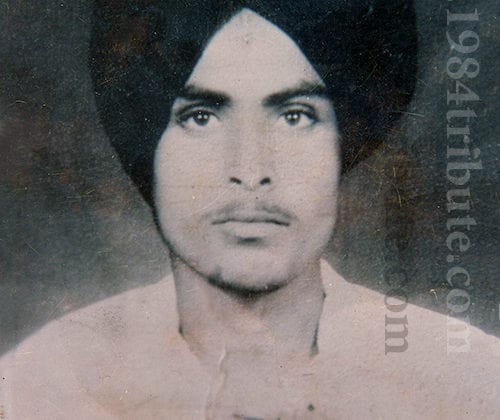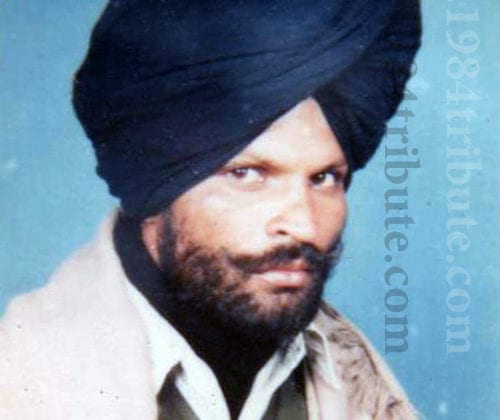Shaheed Bhai Bikram Singh Bikkar
Shaheed Bhai Bikram Singh Bikkar
Khalistan Commando Force
Those who feel the pain of the Quam, are the ones who leave the comfort of their homes.
Those who’s conscience is dead, are the ones who are alive but walking dead.
Blessed the land, blessed the father, blessed the great mother.
The son who has shown the way of life, has told the world for centuries to come.
Referring to the great Sant Giani Jarnail Singh Ji Khalsa Bhindranwale. It is why the great Sikh scholars write that, whenever the Sikh Nation will come under any difficult and testing times, the mind will automatically think of the great ‘General – Jarnail’ and the eyes of love will see no other. The Sikh nation will become one and call out to the great Sant Giani Jarnail Singh Ji Khalsa Bhindranwale.
One such individual who was inspired and walked the path of a freedom fighter for the sake of the Sikh nation was Shaheed Bhai Bikram Singh Bikkar. Bhai Bikram Singh was born on 21st June 1965 to the blessed womb of mother Mata Kuljit Kaur and father Jathedar Sardar Jaswant Singh in the village of Khudda, Dasuya near Tanda, Hoshiarpur. Bhai Bikram Singh was the eldest sibling of three children, a younger sister Bibi Paramjit Kaur and brother Bhai Amarjit Singh, who he loved dearly. Bhai Bikram Singh studied up to tenth grade at the local village school. Bhai Bikram Singh was raised in a very devoted and faith loving family. From a young age Bhai Bikram Singh had been blessed with Amrit and was baptised from the Misl Shaheedan Tarna Dal Harian Vela Nihang Singh Jatha.
Bhai Bikram Singh would wake up at Amritvela, early hours of the morning to perform his daily prayers Nitnem and meditate Waheguru, chanting on God’s name. After which he would then make his way to the village Gurdwara to be blessed with the presence of the Guru; Sri Guru Granth Sahib Ji Maharaj and serve by doing the Chaur Sahib Sewa. He would do this daily. More often than not. Bhai Bikram Singh would wear the tradition attire of Kurta Pyjama with a blue or black round style Dastar (turban). Many villagers would lovingly address him as ‘Baba’. Bhai Bikram Singh did not pay very much attention to academics or studies, his heart was more attuned to a religious upbringing and preferred to gain religious education over worldly study. This meant he was very much involved and participated in many religious events such as Nagar Kirtans, Smagams and Jorh Melas in his area.
Bhai Bikram Singh was a very deep thinker and an introverted personality, he spoke very little. His mind and soul would be occupied in the thoughts of God Waheguru and remained in constant meditation. He was a very traditionally moral individual who had a lot of respect for his parents and in the same manner the village elders too had a lot of love and respect for Bhai Bikram Singh. On religious festivals, Bhai Bikram Singh and his family would regularly visit two very prominent historical Gurdwaras; Gurdwara Sri Garna Sahib (village Bodal) and Gurdwara Tahli Sahib (village Munak Kalan). In this way, Bhai Bikram Singh spent his daily life dedicated and devoted to Sri Guru Granth Sahib Ji Maharaj.
From the 1978 Amritsar Massacre where 13 Singhs were martyred, one such blessed soul was Shaheed Baba Avtar Singh Khudda from the Akhand Kirtani Jatha who lived in the neighbouring village of Kurala. Bhai Bikram Singh knew of him. Then in his own village, Bhai Bikram Singh was very close to a young Singh of 16years of age who lived in the house opposite, Bhai Gurmeet Singh. Bhai Gurmeet Singh was also a devoted and faith loving Sikh who became a martyr during the battle of Amritsar in June 1984 whilst fighting against the heinous Indian army at the complex Sri Harmandir Sahib. Bhai Bikram Singh had a lot of love and trust with Bhai Gurmeet Singh, who had fought for the cause and laid down his life for the Sikh nation.
During the 1980s-90s, Bhai Bikram Singh along with other young Singhs in the locality set up a Jhujaru group known as the Akaal Federation. These Jhujaru Singhs contributed hugely to the struggle and fight for freedom. There was one such Jhujaru Singh, Bhai Swaran Singh Nihang who would always wear Khalsa attire, always ready for battle. It was known that the followers of Narakhdhari cult would tremble at the sound of his name. Bhai Swaran Singh Nihang and Jathedar Bhai Jagjit Singh Nihang (Billu) together contributed massively to the cause, as well as preaching Sikhi to youngsters in the surrounding villages and raising awareness of the oppression and injustices imposed on the Sikh nation. On 15th May 1987, Bhai Swaran Singh Nihang became a martyr, shot dead by police near the village of Tanda. Bhai Bikram Singh’s younger brother Bhai Charanjit Singh was very close with Bhai Swaran Singh Nihang.
At the time of Sarbat Khalsa held on 29th April 1986, when the call for Khalistan was declared and the armed struggle was at its peak, this was the time Bhai Bikram Singh came into contact with the Jhujaru Singh from Khalistan Commando Force, Bhai Kuljit Singh Daut and Bhai Balbir Singh Bira alias Changiara (village Mohan, Hoshiarpur). Secretly, Bhai Bikram Singh began serving with the Jhujaru Singhs of the Khalistan Commando Force. As a day job, Bhai Bikram Singh would drive the village children to school in an Auto (three-wheeler vehicle). Then during the day, he would set-up shop and sell household items from his home. Often Bhai Bikram Singh would help and support the Jhujaru Singhs where he could, within his means and remain anonymous. Not only did he provide food and shelter for the Jhujaru Singhs, he then became involved in participating in actions and served with the Jhujaru Singhs in eliminating anti-Sikh elements.
As hard as he tried to remain anonymous the police soon found out and began to harass Bhai Bikram Singh. A case was lodged against him, he was arrested and taken to Kapurthala jail. Jathedar Bhai Gurcharan Singh Nihang managed to get him released on bail. Even after this, Bhai Bikram Singh continued to serve the Guru and the Panth, serving shoulder to shoulder with Jhujaru Singhs and never wavering. For this reason, he was well respected by all. Bhai Bikram Singh also served with another Jhujaru group called the Dusht Sodh Commando Force of Khalistan eliminating many perpetrators and enemies of the Sikh nation. Both, Bhindranwala Tiger Force of Khalistan and Dusht Sodh Commando Force of Khalistan worked and fought together. They had the surrounding areas covered and maintained outlaw rule. They supported all communities and kept families safe. The police could not touch any of them.
From Hoshiarpur, in the village of Tanda Urmar was a known comrade by the name of Sohan Singh, who spoke blasphemy against the Sikh faith and the fight for a free nation. His vulgar proclamations were enough to get him into trouble, but he was also known as a police tout and worked closely with the local police to disclose the whereabouts of Jhujaru Singhs. On many occasions he was warned by the Jhujaru Singhs, but he did not mend his ways rather he became more vocal knowing he was under the safeguard of the police. But not for long. In the end on 27th April 1989, the Jhujaru Singhs caught him and riddled his body with bullets during broad daylight. This action was collectively planned and executed by Bhai Balbir Singh Changiara, Bhai Jasvir Singh Bhikhi, Bhai Charanjit Singh Khudda and Bhai Bikram Singh Bikkar. In celebration, the Jhujaru Singhs danced round the fallen body of the comrade and roared slogans of ‘Bole So Nihal Sat Sri Akaal’. Bhai Balbir Singh Changiara picked up the rifle owned by the comrade Sohan Singh and as he went to smash and break it in half, the firearm triggered and shot himself in the thigh. Bhai Bikram Singh picked Bhai Balbir Singh and sat him on the back of a scooter. They quickly made their way to a doctor in the village of Bhunga (near Hariana, Hoshiarpur). The doctor extracted the bullet from his thigh. Bhai Bikram Singh’s father then took Bhai Balbir Singh to a relative’s house in the village of Moranwali where he was looked after.
The police received news of comrade Sohan Singh’s killing and so a hunt began to find the Jhujaru Singhs responsible. The doctor was found and arrested by the police, Bhai Balbir Singh Changiara was also found and arrested. Bhai Bikram Singh was back at home during this time, the police surrounded his house and captured him too. Bhai Bikram Singh’s father worked as a banker at a corporate bank. When he found out what happened he immediately left work and made his way to the police station. However, the police officials at any of the local police stations were not disclosing the Jhujaru Singhs whereabouts. Following a long stretch of eight days of back and forth, local tea seller with a stand right outside the police station informed Bhai Bikram Singh’s father that a young Amritdhari Singh by the name of Bikram Singh had been taken to the CIA staff centre in Dasuya. It was said that Bhai Bikram Singh’s body had been severely tortured but he kept chanting God’s name, Waheguru, throughout.
On 5th May 1989, it was with great difficulty and only after giving police money were Bhai Bikram Singh’s parents able to meet their son. His parents met him in his cell and were able to feed him a hot meal that they had brought with them from home. Bhai Bikram Singh was in a very bad physical state, his body had been electrocuted, his groin ripped apart and countless lash marks on his body where he had been continuously beaten. For the next few days his parents continued to visit him and fed him hot meals.
On around the thirteenth day, Bhai Bikram Singh’s parents were humiliated and threatened and made to leave the police premises. The police shouted at them telling them, your son is no longer here. Till this day, Bhai Bikram Singh’s father went looking for his son in every police station and has never been found. One account of information was received on 15th May 1989, that Bhai Bikram Singh had attained Shaheedi (martyrdom) due to the extent of the injuries he had endured during the heinous torture inflicted upon him.
But then there was someone else who said that on 16th May 1989, the police had taken him close to the village of Dasuya and killed him in a fake encounter. Based on this information received, Bhai Bikram Singh Bikkar attained Shaheedi (martyrdom) at the hands of the Punjab police between the 15th and 16th May 1989 and his name joined many other great Shaheeds of that era.
The police did not spare Bhai Bikram Singh’s fellow Jhujaru Singh, Bhai Balbir Singh Changiara. The police tore open his stitches and tortured him half to death. They then took Bhai Balbir Singh close to the village of Dasuya killing him in a fake encounter, attaining Shaheedi (martyrdom). The contribution and sacrifice of these great Jhujaru Singhs are etched in the history pages for the fight for Khalsa Raj (Khalistan). The entire Khalsa Panth honour these great souls and remain forever in debt to them – Khalistan Zindabad!
Information given by the family of Shaheed Bhai Bikram Singh Bikkar



